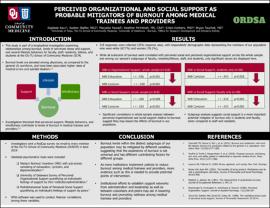| dc.description.abstract | BACKGROUND: National trends show that employees and trainees in the medical field are susceptible to burnout. To our knowledge, no studies have been published on burnout moderators, such as perceived support and lifestyle behaviors. This study is part of a larger, longitudinal investigation examining the relationships among burnout, levels of perceived stress, levels of perceived support (social and organizational), and several lifestyle behaviors for faculty, staff, residents, fellows, and students at the OU-TU School of Community Medicine (OUSCM).
METHODS: Investigators sent an email survey to every member of the OUSCM in April 2019. It included validated measures such as the Maslach Burnout Inventory (MBI), University of Delaware Survey of Perceived Organizational Support, and the Multidimensional Scale of Perceived Social Support, alongside questions about lifestyle behaviors. MBI subscores of exhaustion and cynicism were stratified in the analysis. SPSS software was used to conduct Pearson correlations among these variables.
RESULTS: 318 responses were collected (35% response rate), with respondents’ demographic data representing the white (67.7%), women (78.1%), and staff (57.2%) members of the population. Among the whole sample, levels of perceived organizational support had a moderate negative correlation relative to burnout subscores of exhaustion (r=-.556, p<0.001) and cynicism (r=-.558, p<0.001). Likewise, levels of perceived social support had a weak negative correlation to exhaustion (r= -.169, p = 0.008) and cynicism (r= -.233, p<0.001). Among the disaggregated subgroups of students and faculty, moderate negative correlations were found between perceived social support and burnout subscores. Social support had a moderate negative correlation only with cynicism among students (r= -.453, p=0.006), while social support had moderate negative correlations with both exhaustion (r=-.514 p<0.001) and cynicism (-.555, p<0.001) among faculty. There were no significant relationships found between these two variables among staff members and resident physician subgroups.
CONCLUSION: Because of a low response rate, our sample’s demographics may not be representative of our populations and may potentially limit generalization based on these results. However, the significant correlations found in whole sample analysis between perceived organizational and social support relative to burnout suggest that these variables may lessen the effects of burnout in our population. Moreover, subgroup analysis suggests that social support is a more important potential mitigator of burnout only in students and faculty, when compared to staff and residents. Furthermore, this finding supports that burnout levels within distinct subgroups of our population may be mitigated by different variables. | en_US |


